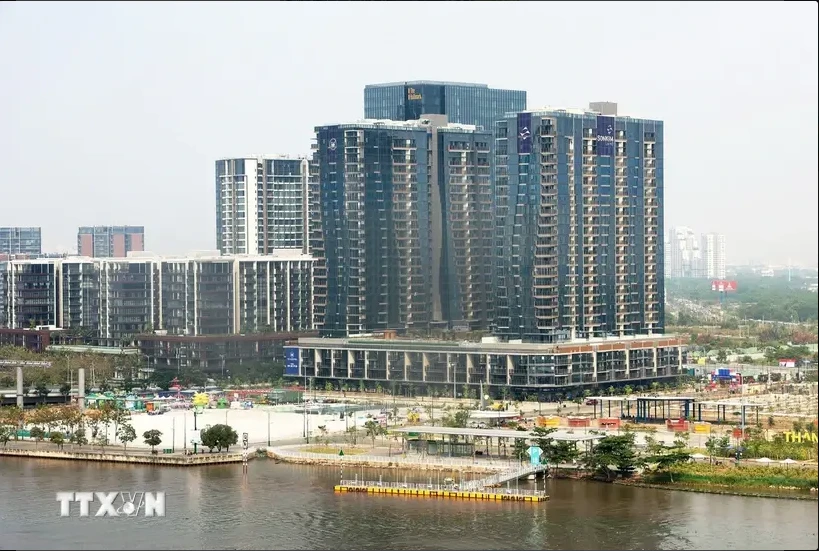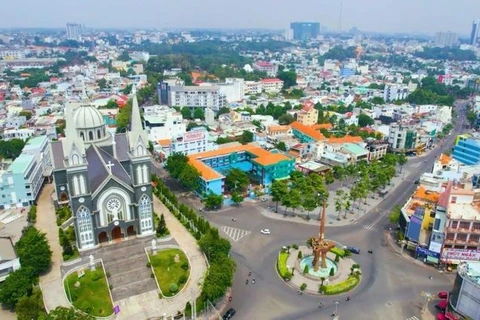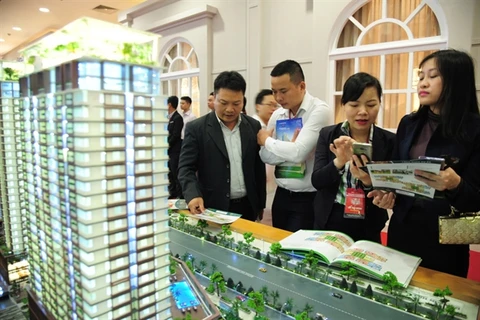
HCM City (VNA) – The real estate market in Ho Chi Minh City has witnessed positive changes over the past nine months.
Chairman of the Ho Chi Minh City Real Estate Association Le Hoang Chau said that the city’s real estate market overcame its most difficult period in the first quarter of 2023. Since then, the market has gradually recovered and this trend will not be reversed.
At the end of 2023, the real estate market decreased by 0.8%. However, in the first nine months of 2024, the market had positive growth, reaching about 6-7%. Nine commercial housing projects in the city have got approval for investment; four commercial housing projects are eligible to mobilise capital with a total of 1,011 units, including 678 apartments and 44 low-rise houses. All these apartments are in the high-end segment, meaning that no apartments in the mid-range or affordable segments are offered to the market.
Vice President of the Vietnam Association of Real Estate Brokers Pham Lam said the real estate market is getting brighter thanks to important driving forces.
In terms of policy, ministries, agencies and localities have implemented legal regulations more transparently. The Government is also determined in implementing infrastructure projects to create momentum for the development of the whole country.
Infrastructure development has supported the residential and industrial park real estate markets. Meanwhile, capital sources are improved as many foreign investors have invested in large projects in Ho Chi Minh City and the neighbouring province of Binh Duong.
Lam said that the government has also made efforts to promote credit and interest rate stability for home buyers. Many banks are willing to offer a fixed interest rate for three years at only 5%. With this interest rate, home buyers have easier access to capital, he said.
Another driving force is market confidence, including the confidence of investors and the brokerage team. From 2021 to 2023, the brokerage force decreased significantly. Many large enterprises are facing difficulties and many of them had to downsize, even reducing up to 90% of their staff, which leads to a dispersion of forces.
However, this can be also considered a good sign because now, brokers need to have more knowledge and skills than the traditional approach to customers in the past. A decrease in quantity but an increase in quality will be positive for the market, Lam noted.
Legal issues
According to economic experts, although the real estate market has shown signs of improvement, the number of apartments in the first eight months of 2024 decreased by more than 94.9%, reaching only 14,286 units compared to the same period in 2023.
No mergers and acquisitions projects have been implemented, while such projects can help clear inventory faster and bring in investors with stronger financial capacity. However, these transactions are being blocked by regulations in the Law on Real Estate Business, requiring the transferor to fulfill financial obligations before being allowed to transfer.
Another problem is that housing prices have increased by 15-20% due to the law of supply and demand. When supply is scarce and demand is high, the rise in housing prices are inevitable. This makes it difficult for people to access housing.
Su Ngoc Khuong, Senior Director of Investment at Savills Vietnam, said that foreign investors still find it difficult to access real estate in Hanoi and Ho Chi Minh City due to legal issues and access to land plots.
For real estate groups that generate cash flow such as offices, shopping malls, resorts and especially industrial parks, the rate of return often fluctuates from 6-8%. These are the segments that foreign investors previously prioritised to quickly access the Vietnamese market.
However, the current situation has become more difficult because foreign investors are still interested in the residential real estate sector, but the number of transactions is very limited./.






















